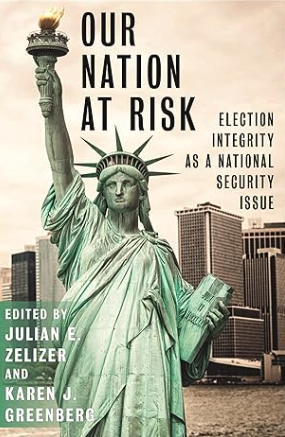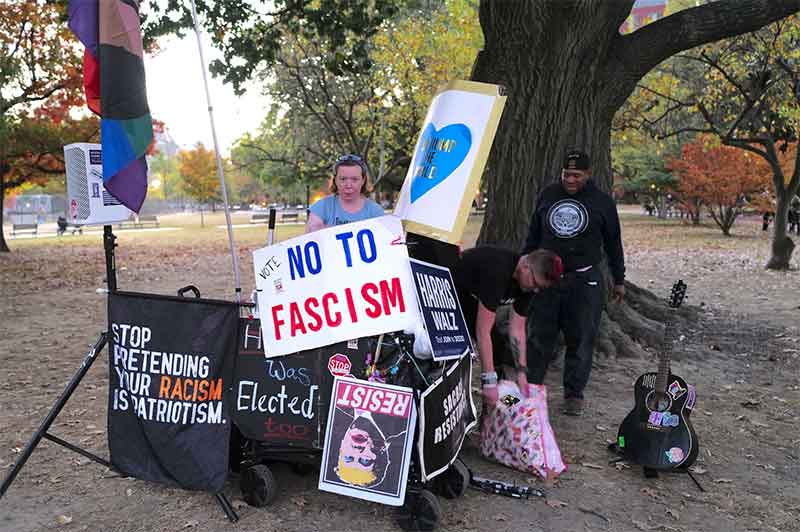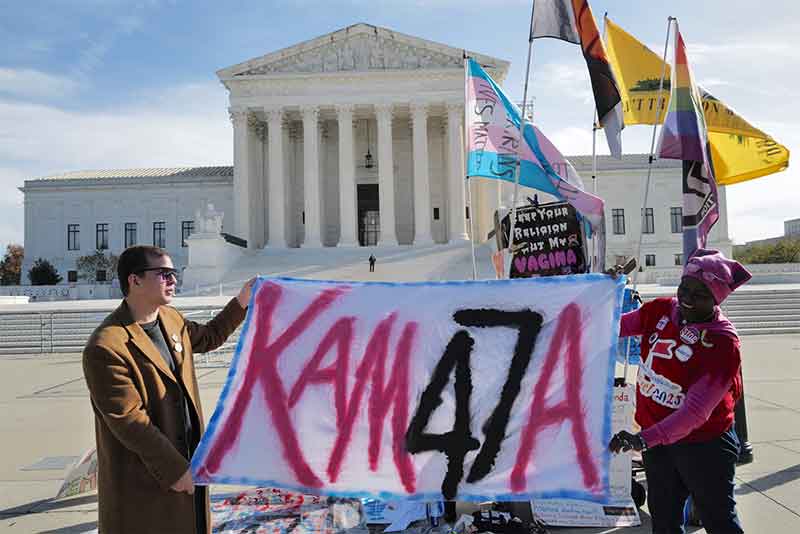by Julian E. Zelizer and Karen J. Greenberg

Officials and election experts are now struggling in a big-time way. How, they wonder, can they effectively address mounting threats — of violence, election denialism, foreign influence, and voter discrimination? Do they run the risk of alarming the public to the point of reducing voter turnout? Are there reasons to assuage fears about either election disinformation or possible election interference in 2024? Standing in Pointe du Hoc, France, to mark the anniversary of D-Day, President Biden told the world that those who fought in that pivotal battle are “asking us to do our job: to protect freedom in our time, to defend democracy.” Election security would be a good place to start.
Perhaps one way to assess the question of election stability and security in 2024 is to ask: How different is this election from earlier tumultuous ones in American history?
What, if any, lessons can we draw from the past? Or are we in genuinely uncharted territory today?
In truth, when it comes to presidential elections, this country has faced some frightening moments in its history, ones that touch on a number of the fears that confront us today. We may never have faced the likes of Donald Trump, but we have experienced disputed vote tallies, Supreme Court interference, threats of violence, voting rights restrictions, and a lack of confidence in the process itself.
Contested Elections
Donald Trump has made no bones about it. Should he lose the coming election, he reserves the “right” to refuse to accept the results. In 2020, his denial of the results led to a violent attempt to block Congress from certifying the vote on the following January 6th. To date, any accountability for his past actions has been minimal. Found guilty last month of falsifying business records to conceal election law violations in 2016, he has yet to be sentenced and may well appeal all the way up to a sympathetic Supreme Court. Moreover, he hasn’t been tried yet in Georgia and in federal court in Washington, D.C., on significantly more serious criminal charges about ways he and his followers tried to subvert the results of the 2020 election — and he’s unlikely to be before the November elections.
Most Republicans have remained at his side. Indeed, election denialism has become a rallying point rather than a mark of shame. As a result, the former president continues to engage in implied threats to the democratic political process with unwavering partisan support. And were he to disappear from the political scene thanks to a decisive defeat in 2024, others could follow him in exploiting the democratic system for political gain.
While there have been a handful of disputed presidential election results since the country’s founding, two stand out. In the election of 1876, Republican Rutherford B. Hayes lost the popular and electoral vote to Samuel Tilden. The Republicans protested that, in three states, the results were uncertain. To resolve the issue, Congress created a bipartisan panel, including House and Senate representatives and five Supreme Court justices. That panel then granted Hayes all 20 disputed electoral votes, giving him a one-point electoral margin over Tilden, and so making him president. Ultimately, the country found a way forward.
More than a century later, in the 2000 election between Republican George W. Bush and Democrat Al Gore, the results again lay in dispute. Gore had won the popular vote, but the electoral vote was too close to call. All eyes focused on Florida where the results would determine the outcome. Although the Florida Supreme Court ordered a statewide recount, the Supreme Court stopped it and, in doing so, made Bush president.
In neither post-election resolution did the losing candidate contest the results, though Tilden waited four months before conceding. The day after the Supreme Court’s decision, Gore conceded, saying, “I accept the finality of this outcome” — a stark contrast to Donald Trump who still refuses to concede that the 2020 election result was legitimate.
It’s worth mentioning that both elections had major consequences. Hayes’s win, the result of a brokered deal, also ended the post-Civil War Reconstruction era and led to the withdrawal of U.S. troops from the South. That election would prove an integral part of efforts to undo the biggest push the nation ever had to achieve racial justice.
The Bush administration, in turn, failed to prevent the attacks of September 11, 2001, and then launched a multidecade-long “war on terror” that would destabilize parts of the globe from South Asia to the Middle East and Africa, while, according to the Costs of War Project, leading to the deaths of more than 7,000 American service members and more than 177,000 allied military and police in conflicts ranging from Afghanistan and Pakistan to Iraq and Syria, not to mention the deaths of more than 430,000 civilians.
Along with the knowledge that uncertainty can accompany election results, Americans sense as well that violence could indeed loom in as yet unknown ways, thanks to Election 2024.
Violence Before, During, and After an Election
It’s not that Americans have never experienced the threat of violence around elections. The Civil War years saw numerous outbreaks of violence. In 1861, a mob of Confederate supporters tried to gather to storm Congress to stop the certification of Abraham Lincoln as president. There was no violence only because General Winfield Scott, a southerner, made sure the Capitol was protected.
So, too, in 1868, in the runup to the first election of the Reconstruction era between Ulysses S. Grant and Horatio Seymour, Ku Klux Klan violence led to thousands of murders in Georgia, Kansas, and Louisiana, and threats of violence kept voters away from the polls in droves. In the 1876 Tilden-Hayes election in which four states submitted multiple slates of electors to Congress, one popular slogan was “Tilden or Blood.” Expecting violence, President Grant secured the Capitol with troops and prepared to deploy them elsewhere as well.
And then (as now), race and violence were a distinct issue. In 1873, white mobs assaulted a courthouse in Colfax, Louisiana, to remove pro-Reconstruction Republican officials. In 1898, a horde of white North Carolinians conducted a coup against the fusionist government of the city of Wilmington to empower reactionary southern Democrats.
During the last part of the nineteenth and early twentieth centuries, southern Jim Crow laws imposed in response to Reconstruction produced literacy tests and poll taxes that disenfranchised Black voters. And in the twentieth century, racially motivated violence aimed at suppressing the vote became a regular part of election politics.
During “Freedom Summer” in 1964, three civil rights workers — James Chaney, Andrew Goodman, and Mickey Schwerner — were killed by white terrorists for participating in Black voter registration initiatives in Mississippi. When demonstrators were assaulted by police and white mobs on the Edmund Pettus Bridge in Alabama during a nonviolent march on March 7, 1965, in support of voting rights legislation, the nation witnessed just how much brutality then existed when it came to those seeking to fulfill the nation’s democratic promise.
Twenty-First-Century Challenges
Experts anticipate a surge of violence at the polls in 2024. A Brennan Center survey found that, since 2020, “38 percent of local election officials experienced threats, harassment, or abuse for doing their jobs.” To counter this, the federal government and individual states have already mounted efforts intended to protect both voters and officials. Since 2020, in fact, the Department of Justice, the Department of Homeland Security, and Congress have ponied up an extra $205 million for election protection. And yet, as the Brennan Center points out, a growing fear of violence and harassment has led to “an exodus from the field” of election work. Not surprisingly, a recent Ipsos/Reuters poll reported that two out of three Americans are concerned about the prospect of election violence in 2024 and fear the possibility of a worse version of the January 6th insurrection at the Capitol.
Violence at the polls has, in fact, plagued elections throughout the nation’s history, as Steven Hahn recounts in his new book, Illiberal America, while the Voting Rights Act of 1965 proved to be fragile indeed, as red states continued to put voting restrictions in place based on false allegations of voter fraud.
Worse yet are the threats already emanating from former president Trump and Republicans close to him. The embrace of such anti-democratic sentiment by such a potentially powerful figure and his party at a time when global anti-democratic forces are on the rise has already created an historically rare level of instability in this country.
And keep in mind that not all the dangers of this moment have a footprint in the American past. There are new challenges that face the nation today. Disinformation is a case in point. While false information has always been a part of politics — smears against alleged communists were, for instance, a staple of the early Cold War years — the Internet has proven a game-changer when it comes to facilitating false narratives that could lead to both voter suppression and a deep mistrust of election results.
The scale and scope of disinformation in the modern age has no precedent. Without editorial control and given the ease of disseminating misinformation, guardrails have crumbled. Experts warn that the massive communications infrastructure that transmits bad information could undermine confidence in election results in ways never before seen. Worse yet, Artificial Intelligence (AI) is likely to prove a particularly dangerous mechanism for producing electoral deepfakes.
Additionally, foreign interference seems now to have become a permanent feature of American elections, although to what end remains in question. As the 2019 report issued by Special Counsel Robert Mueller demonstrated, Russia’s attempts to interfere with the 2016 election, including conducting “information warfare” and attacking voter databases, proved “sweeping and systematic.”
Where Are We Today?
When it comes to elections, despite Donald Trump, it’s not been all downhill. In 2021, the Department of Justice launched an Election Threat Task Force aimed at individuals who posed threats to election workers. To date, 17 people have indeed been prosecuted. Significantly, in 2022, Congress passed the Electoral Count Reform Act, an attempt to update the Electoral Count Act of 1887 and improve the process of certifying the vote, ensuring that the transition period between election day and inauguration day goes smoothly. In addition, in 2022, Congress passed legislation to establish a Foreign Malign Influence Center to counter disinformation from overseas generally, not just in elections.
The federal courts have also proven to be barriers against electoral subversion. In the wake of the 2020 election, they repeatedly denied Donald Trump success in his efforts to overturn the results. Yet even this source of democratic protection has been limited, while the present all too conservative Supreme Court, which in 2013 gutted the Voting Rights Act, has continued to weaken voter protections.
The question then remains: What do the lessons of history — and recent reforms — tell us about our current moment? On the one hand, history suggests that election dysfunction has been overcome time and again. Whether we’re talking about contested results, challenges to voter suppression, outbreaks of violence, or presidents elected without national majorities, such situations have been resolved reasonably successfully in the past. Meanwhile, new measures have been put in place for the security of election workers, the certification of the vote, and the deterrence of voter suppression in new ways. In other words, American democracy has continued, despite deeply rooted problems.
And yet, it’s also clear that past negative experiences have, in our moment, been twisted into newly dangerous configurations. In place of contested elections, there is now outright election denialism. In addition to racially motivated violence, there’s growing extremist violence aimed at the institution of voting itself. In place of partisan campaign rhetoric, we’re experiencing the spread of hate speech based on race, ethnicity, gender, or simply opposition to democracy itself. Instead of support for the outlawing of post-election violence, we now live with references to the imprisoned offenders of January 6, 2021, as “hostages.” And just because this country has survived challenging times in the past doesn’t mean it will do so again, particularly as pressure against democratic norms ramps up globally.
Many would blame such election instability on Donald Trump alone and there’s no question that he does have a profound knack for manipulating public discourse and threatening to upend election laws, not to speak of the rules, norms, and processes that underlie election legitimacy. However significant, though, he’s not the only factor that warrants attention in this election year.
The largest threats to our elections now come not from weaponized technology, or a tone-deaf Congress or Supreme Court, or even perhaps from Donald Trump himself (though dangerous he may be). The biggest challenge may lie in the absence of any long-term focus on the need for fundamental structural changes in how our elections are run. For centuries, we as a nation have made incremental changes in response to moments of election-related crisis. But far more is needed if we are to escape a future in which questions about whether the electoral process itself is legitimate and whether the results will be accepted become part of every election season.
Subscribe to Our Newsletter
Get the latest CounterCurrents updates delivered straight to your inbox.
Our democratic system seems increasingly frail. To face the future with confidence in the most elemental building block of our democracy, we need a longer-term perspective. The elimination of the Electoral College, greater accountability for violence in and around elections, tools for curbing disinformation and improving election administration, a vast increase in funding for public education about polling sites and candidate platforms, strict accountability for attempted voter suppression, and heightened efforts to secure voting rights for all are badly needed. In other words, rather than facing a continual nip and tuck of problems as they appear, what we really need is a commission that will offer a full-scale rethinking of election security in the twenty-first century, while focusing on getting Congress to move toward developing a comprehensive new strategy to deal with it. Even if we get through the 2024 election cycle intact and violence-free, the task of election reform remains both essential and, sadly, all too ignored.
Perhaps, however, there could be a silver lining in our unnerving moment if our ongoing election troubles lead us to conclude that the time for keeping our fingers crossed should end and the time for wholesale reform begin.
Julian E. Zelizer is a professor of history and public affairs at Princeton University. He is also a political analyst for CNN, a contributor to National Public Radio’s Here & Now, and the co-editor of the forthcoming new book Our Nation at Risk: Election Integrity as a National Security Issue.
Karen J. Greenberg is the director of the Center on National Security at Fordham Law. She is also the editor-in-chief of the daily CNS Soufan Group Morning Brief and the weekly CNS Aon Cyber Brief. She is the co-editor of the forthcoming new book Our Nation at Risk: Election Integrity as a National Security Issue.
Originally published in TomDispatch.com
Copyright 2024 Julian E. Zelizer and Karen J. Greenberg















































